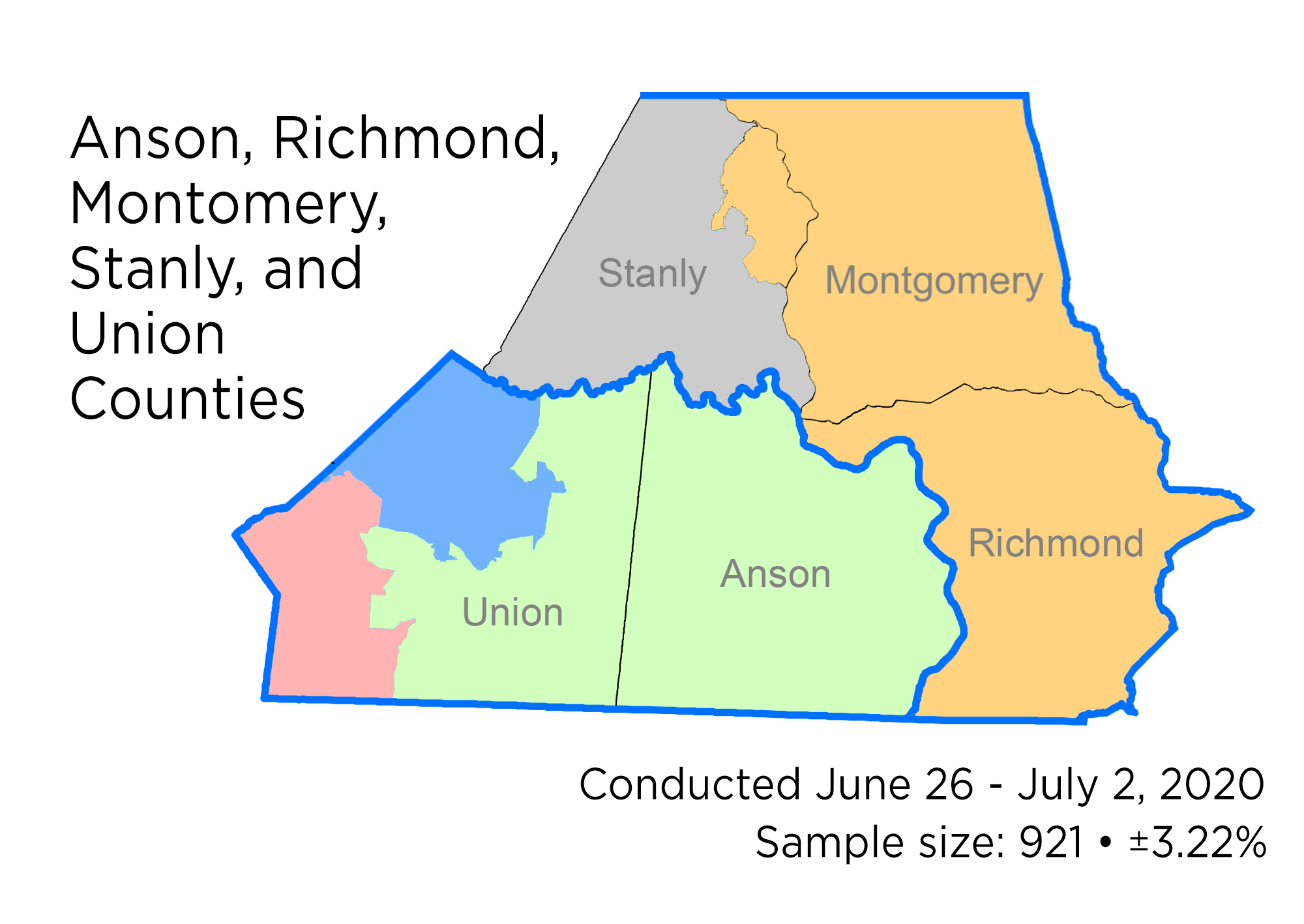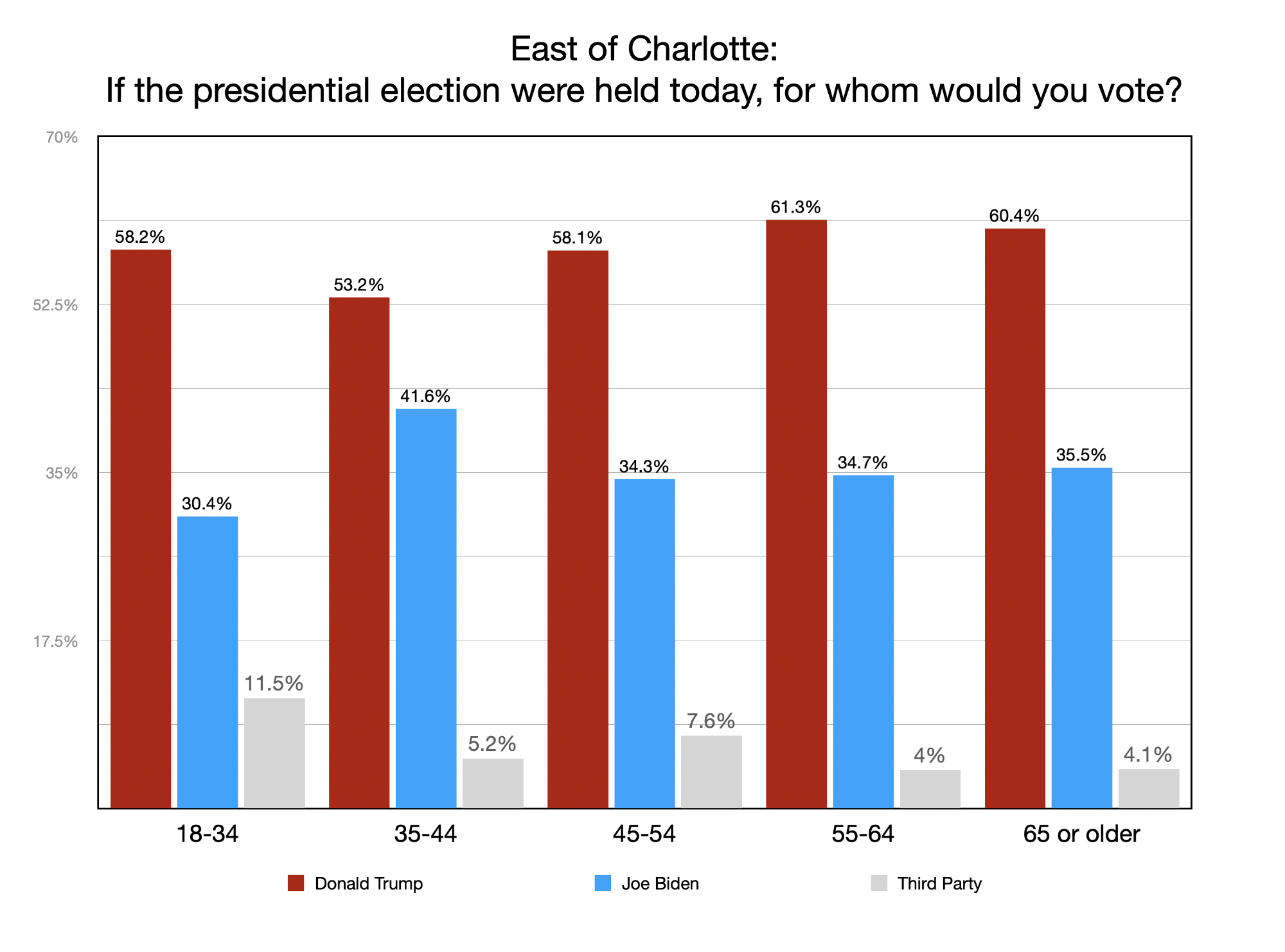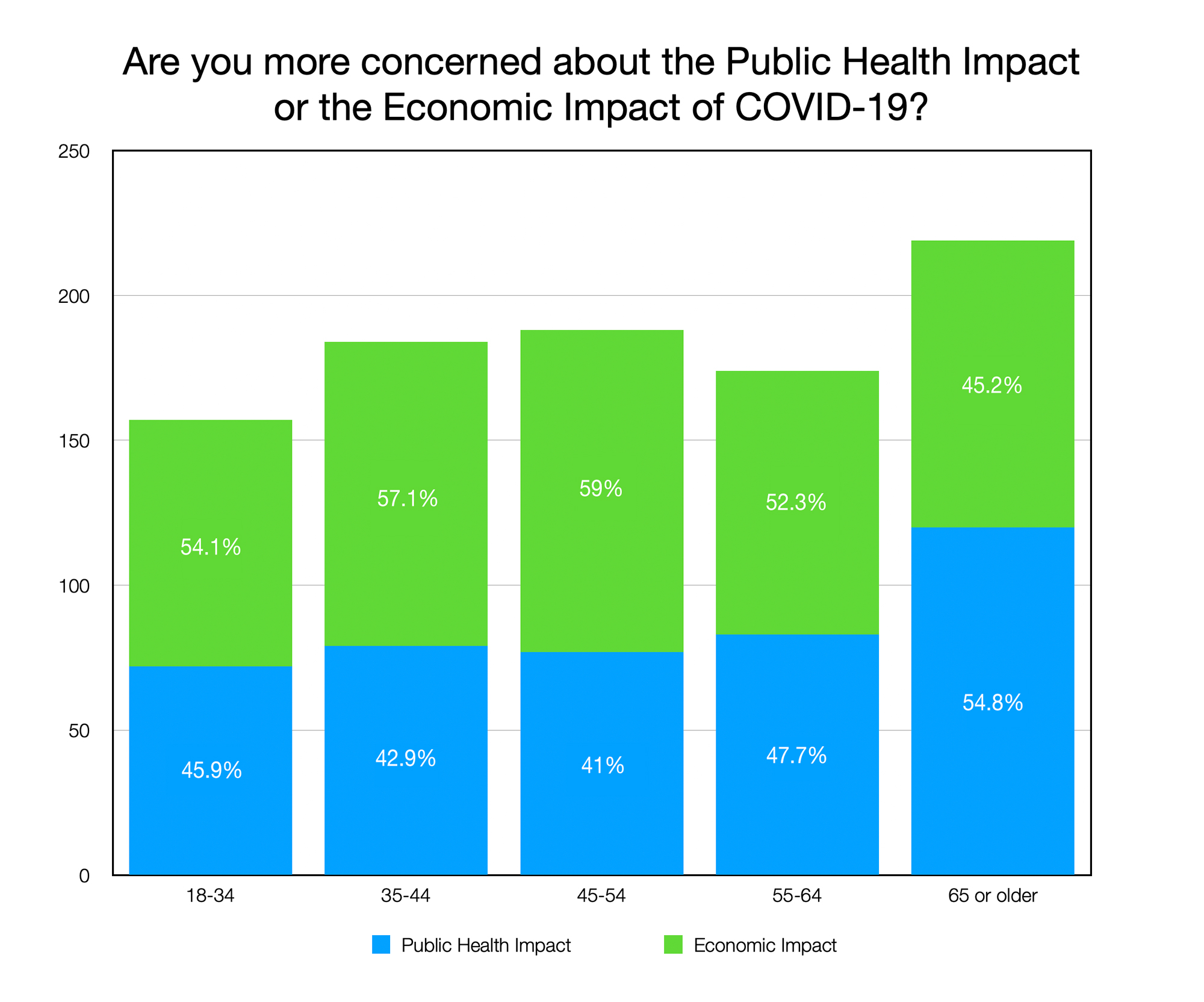
Demographics and Voting Behaviors
921 likely voters (53.6% of whom were female) from four south-central counties east of Charlotte (Anson, Richmond, Stanly and Union) were surveyed from June 26 to July 2, 2020. 70.3% were white, 16.5% were black, and 5.3% were Hispanic or Latino.
The age ranges of in this group was fairly evenly distributed, with 17% being 18 to 34 years old, 20% being 35 to 44 years old, 20.4% being 45 to 54 years old, and 18.9% being 55 to 64 years old. Those 65 years old or older comprised just over a quarter of the total, at 23.7%.
Respondents in this region are fairly split between rural voters (46.2%) and suburban voters, at 45.9%. Those living in urban areas were just 7.9% of those surveyed. 24% identified as “suburban women,” a key demographic in the upcoming presidential election.
Two-thirds (67.4%) of this group reported annual income of $100,000 or less. 29.9% reported having a Bachelor’s or advanced degree, the second highest only to the Triad Region among those surveyed across the state.
The region east of Charlotte has the highest number of registered Republicans of the four regions surveyed, at 43.3%. Democrats accounted for 30.7% of the total, while unaffiliated voters came in at 24.4%.
51.8% of the total respondents under 55 years of age identified as being conservative and 27.5% identified as being “very conservative.” 56.8% of those 55 years or older identified as being “very conservative.” Those identifying as “very liberal” was the lowest of any other region in the state, with just 10.5% of those between the ages of 18 and 34 saying that they were “very liberal.” The percentages decrease dramatically for those over 35 years of age, with 5.8% of those 35 and 44 years of age identifying as “very liberal.” Just 1% of those surveyed in the region east of Charlotte said that they were “very liberal.”

Of those voters surveyed across North Carolina, support for President Donald Trump reached its zenith in the region east of Charlotte. A significant majority (58.3%) said that they intended to vote for Mr. Trump, while 35.4% said they would vote for Mr. Biden. 6.3% indicated that they would vote for an unnamed, third-party candidate.
While Mr. Trump enjoys majority support among both men and women, his support is higher among men, at 62.4%. 54.7% of women polled in the region east of Charlotte support Mr. Trump.
Those in the region east of Charlotte who view themselves as moderates overwhelmingly support for Mr. Biden, at 60.6%.
82% of black voters in this region support Mr. Biden, while 70.9% of white voters support Mr. Trump.
Majorities in every age range in the region east of Charlotte say that they will vote for Mr. Trump.
Majorities in every income range in the region east of Charlotte say that they will vote for Mr. Trump, with the highest support coming from those reporting an annual income of between $50,000 and $99,000 at 62.1%.
The Coronavirus Pandemic
As with the Mountain Region, a small majority (53.3%) of survey respondents in the region east of Charlotte felt that the economic impact of the COVID-19 pandemic was of greater concern than was its public health impact. The region east of Charlotte was also the only one where a majority (54.3%) of those 18 to 34 years of age felt that the economic impact of the COVID-19 pandemic was of greater concern than was its public health impact. The only respondents in this region who thought that the public health impact of the COVID-19 pandemic was of greater concern than was its economic impact were 65 years or older.

As with other regions in the state, Republicans and Democrats are sharply divided over the question. While 78.2% of Republicans felt that the impact on the economy was greater, 82.3% of Democrats felt that the impact on public health was of greater concern than was the impact on the economy. Unaffiliated voters in the region east of Charlotte were more evenly divided, with 46.5% saying the impact on public health was of greater concern than was the impact on the economy, and 53.5% saying that the impact on the economy was greater.
As is the case across the state, a strong majority of self-identified conservatives are more concerned with the economic impact of the virus than they are the public health impact (at 75.4%) while 84.8% of self-identified liberals are more concerned with its public health impact. 67.2% of self-identified moderates said the impact on public health was of more concern. These percentages are consistent with the other regions surveyed.
Protests
When asked about the protests which have occurred in the wake of the killing of George Floyd, the group surveyed in the region east of Charlotte were fairly evenly divided over the question, with men supporting the protests 47.8% to 52.2% and women supporting the protests 50.9% to 49.1%. These numbers reflect the lowest overall percentage of support for the protests than in other regions of the state.
The protests found most support among those between 18 and 34 years of age (55.2%) and those between 35 and 44 years of age (55.5%). A significant majority of those 65 years and older opposed the protest by 59.4%.
75.1% of Republicans opposed the protests, while 81.9% of Democrats and 60.6% of Unaffiliated voters supported them. A majority (57.9%) of rural voters opposed the protests, while urban and suburban voters approved of them, at 62.1% and 54.7%, respectively.
Looting
Respondents were asked the question “Do you agree or disagree that the rioting and looting that has occurred during the protests is justified to bring about necessary changes?” An overwhelming majority of those surveyed (84.6%) disagree that riots and looting are justified.
Younger people (those aged 18 to 34 years old) also disagree that riots and looting are justified by a majority of 72.9%, the highest level of opposition among this age group in the state.
Republicans are united in their disagreement that the riots and looting are justified, with 94.2% indicating so. Interestingly, nearly a third of Democrats surveyed (29.4%) say they agree that the riots and looting are justified. Unaffiliated and third party voters disagree that the riots and looting are justified at 85.5% and 80.9%, respectively.
The only demographic group in the region east of Charlotte who believe that the riots and looting are justified are those identifying as “very liberal,” at 55%.
This is the third article in a series of four that will summarize the findings of polls commissioned by the Carolina Leadership Coalition over the summer. These polls were conducted by an award-winning national public opinion and predictive analytics firm which surveyed likely general election voters in four discrete geographic regions of North Carolina. You can download the full model results here.



